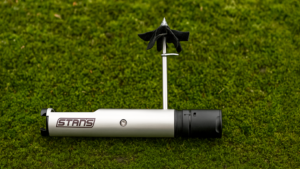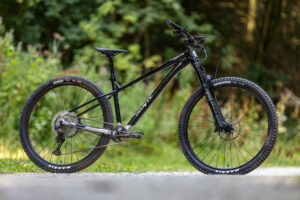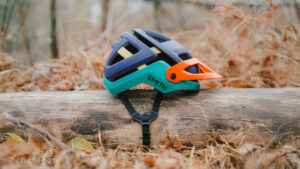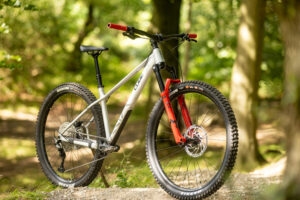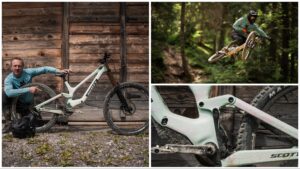The Merida One-Sixty FR is a new, longer travel, freeride and bike park machine. Built around an aluminium frame, it runs a mullet wheel set up, a suitably robust component package and is incredibly keenly priced.
Merida One-Sixty FR 600 first ride review
The Merida One-Sixty FR was launched at September’s EX Enduro in Devon, so our first ride testing and evaluation was carried out on terrain in and around the event with an uplift day in the local area beforehand. It’s familiar testing ground for us and terrain where we’ve previously evaluated the best enduro mountain bikes.
With a coil rear shock and a 180mm travel fork, this new Merida is designed to handle new school machine-built jump and berm trails that have increasingly popped up over recent years. It’s targeted at progressive riders taking their riding to the next level as much as younger rippers on a budget looking for a tough durable bike for enduro, DH or uplift laps.
Keeping an eye on a lower price point means, unlike the regular Merida One-Sixty trail bike, there is no carbon fibre option. The One-Sixty FR is only available with an aluminium frame, across two different models, topping out at £3.5k on this DVO suspension-clad 600 version.

Testing was in the heart of Exmoor. Photo: Paul Box
Frame
Merida’s basic concept was to bring a tougher, more affordable bike that can be hammered in bike parks or push-to-the-top jumpy DH spots – or even become part of rental fleets in uplift destinations. Its frame shares the updated shape and geometry of the current Merida One-Forty and One-Sixty platforms.
The FR carries over Merida’s ‘Agilometer’ geometry philosophy, which (like plenty of other sensible brands) allows riders to choose size based on frame length/reach, rather than seat tube height. Smaller riders can opt for a longer frame to taste and not get penalised by the saddle or top tube getting in the way. Taller riders can benefit too and can run one of the latest-generation dropper posts like Merida’s Team TR 2 here that is infinitely adjustable up to 230mm to achieve the desired saddle height.
One thing that’s slightly at odds with Merida’s sizing philosophy though and may affect a small number of riders is the size-specific tuning on the Fast Link, because while it’s easy enough to reduce spring rate for lighter/shorter riders on longer bikes, there will always be slightly more progression in the suspension than on the smaller frame sizes.

Comprehensive frame protection and upper chain guide as standard
Merida’s five frame sizes see reach measurement extend all the way from 409mm in XShort up to 519mm in XLong. The chainstay is semi size-specific too, with 434mm in the smaller three sizes growing to 437.5mm in the longest two. There’s a typical-for-this-category 63.5mm head angle and a bottom bracket drop of just 2mm, although this didn’t feel high while riding to me.
Smaller details include a removable 4/6mm Allen key in the rear axle and a removable ‘service port’ on the bottom of the BB that makes internal dropper routing much less painful. One-Sixty FR frames use an easy to service BSA threaded bottom bracket and neat features include chunky frame protection and a rear mud guard.
Seeing as the FR is primarily gravity focused, it’s no bad thing the alloy frame here (that weighs 3.6kg in medium size) actually pumps out 171mm travel, rather than the 160mm the name suggests. Pair this with a DVO coil shock and there’s some serious bump-swallowing capacity. And if you’re wondering how the frame delivers all that travel without a pivot in the rear stays, by omitting a complicated bearing and using a ‘P-Flex’ flex-stay setup, the rear stay can bend a little as the suspension cycles rather than requiring a heavier, less stiff and potentially easier to damage pivot set up.

No pivot on the chainstay or seat stay on this aluminium big-hitter
Everyone should be happy that Merida offers a five-year Category 5 (DH) frame warranty on a bike that’s designed to be hammered hard all day long. It’s a bonus few other brands offer in this category, but (judging by internet forum comments at least) not everyone will be as stoked about the internal headset cable routing, and this does seem a bit at odds with the 160FR’s tough, no-nonsense attitude.
Finally, while it is possible to run this bike as a full 29er with Merida’s optional wheel size correction flip chip, the brand feels it works better in this mullet configuration with extra agility to best suit the bike park remit.
Suspension
Merida has partnered with DVO suspension for both the fork and coil shock and this 600 model is actually the first ever bike with DVO’s all-new 38mm-stanchion Onyx. The fork has 180mm travel and a simpler self-balancing air-spring than DVO’s sophisticated titanium coil spring negative OTT design. There are also no bleed ports on lower legs like posher aftermarket Onyx forks. Merida preferred the simplicity of this air spring set up for the bike’s target demographic and having just an upper low speed compression and lower rebound adjuster continue this theme of being easier to set up.

The purposeful Onyx fork sports 180mm of travel and 38mm stanchions
The coil shock on all 160FRs is a Jade X D2 that also shares the minimal adjustment ethos. There is only low speed compression adjustment and a 3-position lock out, but also the subtler tuning ability to change the shock’s bladder back pressure. This level of fettling won’t be for everyone, but since the bladder replaces the (more common) IFP design inside shocks, it means you can affect the force pushing back against the oil inside to stop air and oil mixing. Lower pressures allow the shock to shift direction faster and feel ‘softer’ but increase the chance of cavitation, and higher pressures make the shock feel ‘firmer’. It’s complex, but, in theory, a bladder shock should have a more seamless feel changing direction than an internal floating piston that demands extra friction-generating seals and can cause a lag as the bike moves in and out of rapid compression/rebound cycles.
The Jade’s lock out is a much blunter tuning implement and makes the 160FR seriously locked-out when fully engaged and only marginally less so in the ‘middle’ position. This mid setting feels a bit too rough and choppy to use much, which is a bit of a missed opportunity considering a shock set up with more damping could be just the thing for hitting big jump lines or stuffing the bike into big bike park berms that generate big suspension loads. At least DVO’s shock better handles these big loads by using a broader 14mm piston shaft that’s more robust, stiff and durable compared to many thinner shaft coil shocks that can get bent (especially on bikes with long extender yokes).

Merida has spec’ed DVO suspension at both ends on this FR 600 model
The cheaper 160FR 400 model swaps the Onyx for a Suntour Durolux 38mm fork, which I’ve found a decent performer previously, and also trades Deore 10-51 gears and cranks for Shimano’s budget and robust CUES 1×10-speed drivetrain with a Merida chainset. The cheaper bike also omits the adjustable Merida dropper for fixed travel models that grow in tandem with frame size.
Components
When balancing the budget, it’s obvious Merida has taken care to offer a solid foundation with the kit and prioritised suspension and braking performance, rather than shaving grams on gear like lighter cranks and cassettes that can wear out and need replacing anyway. Alongside the 12-speed Shimano Deore kit with 170mm cranks on all sizes, there are less commonly seen 4-piston TRP Trail EVO brakes with 220mm front and 200mm rear rotors. These have a long lever blade that generates a lot of force and are DH race proven and noticeably pack a lot of power.

The four-pot TRP brakes impressed our tester. Powerful, with a great feel at the lever
Merida’s own brand rims and hubs shod Continental’s madly popular Kryptotal tyres are a smart choice and the tyres are here in Soft compound with the lighter and suppler Enduro Casing on the front and a DH casing on the rear for maximum toughness. Own brand alloy bars and stem round out the kit and come in 780mm wide with a 40mm stem reach.
How it rides
I tested the Merida FR in Devon on EX Enduro terrain and on an uplift day in the local Exmoor area beforehand. The One-Sixty FR 600 only got ridden on fast/steep enduro terrain, so I can’t speak too much about its prowess hitting jumps and massive berms, but it’s clear there’s enough solidity and all essentials are in the right place to get a bit of a shift on.

Conti’s rubber is in a well chosen spec with an Enduro casing and soft compound
The DVO Onyx is really solid and twist-free, but felt a little tight and over damped from new, to the extent that I ended up with rebound fully open even weighing 85kg. The fork doesn’t immediately have the best off-the-top sensitivity then, but it did show signs of freeing up after a full day of uplifting, and my suspicion is it will ease up further after more riding.
With a 400lb spring on the Jade X shock and just under 100psi in the Onyx, there’s good balance and support, and the fork’s self-balancing set up puts the rider in a good zone of using travel freely without feeling like it’s diving through the mid-stroke. The FR 600 felt easy to jump on and ride straight away and geometry and rider position feels well balanced with nothing quirky or disconcerting that saw me fiddling and fussing with the set-up, which obviously bodes well for less experienced riders or rental duties.

Merida’s innovative dropper has a huge range of stroke adjustment
Much like the regular One-Sixty it’s born from, the geometry and steering feels natural, despite my suspicion the 2mm BB drop wasn’t going to be enough to feel like you’re fully ‘in’ the bike when cornering. On the trails, there’s no sense of feet being too high or being perched on top of the wheels when actually working and steering the bike with feet though.
Even weighing over 17kg (almost 38lb), the FR is surprisingly not a total dog to pedal around and also climbs much better than you’d imagine with no excessive bob or instability, even with the pedal platform fully open. With all the grip and tracking on offer (at the rear tyre especially), there’s a ride sensation that remains well controlled and confident, even slinking down unfamiliar and very steep and nadgery tracks at the press launch. After a couple of descents, I got the sense you can trust the FR 600 to not to deliver any nasty surprises. This sense of security was reinforced by the impressive TRP 4-piston brakes that are both powerful and solid with no waggling or inconsistency at the lever.

House brand Merida hardware keeps the cost down but doesn’t compromise performance
Even with all the ridged and rubberised frame protection, the FR isn’t the quietest bike round and can come over a tad clunky on rough descents. Unfortunately, I think this is one of the consequences of using cheaper kit in places like the KMC chain and flimsy feeling Deore shifter and I’m also maybe a bit guilty of becoming conditioned into riding the most expensive kit that tends to be a bit quieter and smoother. I’m making no apologies for not being a fan of the firm and lumpy Merida Expert grips though; but at least they’re easy enough to swap out for something preferable.
Verdict
£3,500 isn’t chicken feed, but in today’s marketplace this Merida One-Sixty FR looks like a hell of a lot of bike for the asking price. It’s solid and stable with decent kit throughout, and compared to rivals like the also recently-launched Kona Process X that comes in at £5,200 (with a not massively superior spec list and similar remit), Merida is asking for £1,700 less hard-earned dosh here on this new One-Sixty FR 600.










